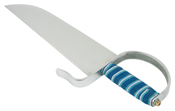Police in Operation Sceptre this week are warning those who carry a knife that they are far more likely to be injured or killed, and risk being sent to prison; and that friends and families who know their loved ones carry knives could also be prosecuted and sent to prison under the law of ‘joint enterprise’.
In Greater Manchester, police are running joint visits with Trading Standards to shops selling knives, besides patrols, and presentations in schools.
Supt Glenn Jones for Greater Manchester Police said: “People who carry a knife often say it is to protect them, but we want people to know those who carry a knife or offensive weapon are more likely to be seriously injured or killed themselves. Not only that, carrying a knife or offensive weapon is against the law and you could face up to four years in prison.
“We all have a role to play in tackling knife crime and during our week of action we are calling on communities to help us in our fight and encourage others to bin the blade before somebody is seriously hurt. Rest assured our work to combat this type of crime doesn’t stop here. We’ll continue to work alongside partner agencies and communities to reduce knife crime across Greater Manchester.”
Deputy Mayor for Greater Manchester Bev Hughes said: “Knife crime devastates the lives of victims and their families and brings misery and fear to our communities. We need to work together – police, local authorities, the voluntary sector and the public – to ensure that everyone understands that carrying a knife can easily end in tragedy. By raising awareness of the consequences I hope that people will make the right decision and not carry a knife. By making the right choice we can save lives and keep our streets safe.”
In Lancashire, knife bins are being used at nine police stations: in Blackpool, Burnley, Preston, Skelmersdale, Morecambe, Fleetwood, Greenbank Blackburn, Chorley and Nelson. Chief Insp Mark Baines said: “They need to be safely wrapped in tape and newspaper before putting in the bins. If anyone is in possession of a knife and is unsure what to do about it, I would urge them to take this opportunity to dispose of it anonymously and safely.”
Nationally, National Police Chiefs’ Council (NPCC) Lead for Knife Crime, Deputy Assistant Commissioner Duncan Ball called for retailers to recognise their responsibility to help keep communities safe and refuse to sell knives to children.
He said: “Previous test purchasing operations have shown that there are still too many retailers who are selling knives to under-18s – nearly 20 per cent. Responsible retailers have signed up to a voluntary code and are asking anyone who looks as though they are under 21 for ID, refusing anyone who can’t provide it and telling the police. We want them to continue and for other retailers to follow their example.
“There are many complex drivers of knife crime and we need a broad approach involving public health and education to stop it at source but halting the sale of knives to children is an action we can take now that will reduce the numbers of knives on the streets.”
Police also raised concern about online retailers.










